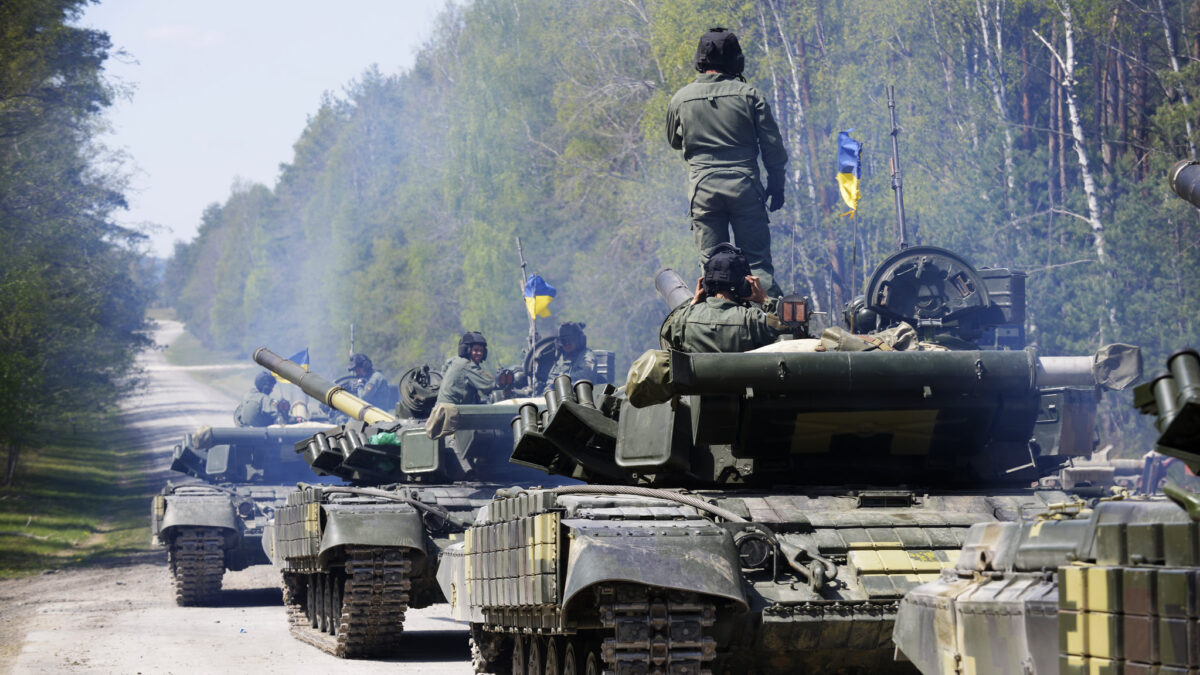Critics of America’s support for Ukraine often cite the latter’s corruption as a rationale not to provide assistance. Ukraine has struggled under the burden of corruption, but that does not override the fact that a Russian victory over Ukraine would be harmful to U.S. national security interests — two things can be true at the same time in a complicated world.
First, from a national security standpoint, Russia is one of a handful of hostile nation-states with nuclear weapons (or advanced nuclear programs) that pose a threat to America and its allies — the other nations being China, Iran, and North Korea.
Should Russia prevail against Ukraine, the threat to Europe and NATO, and thus the likelihood of direct U.S. intervention under NATO’s Article V, would be higher than it is today with the Ukrainians carrying on the fight themselves. A Russian victory in Ukraine would embolden Russian President Putin and confirm his view that the Western powers are weak, with an open invitation to test NATO resolve in the Baltic states.
Instead of a battlefield victory, Russia’s invasion of Ukraine and its resulting massive loss of tanks, artillery, and infantry has reduced the Russian threat to Europe — especially the frontline states of Estonia, Latvia, Lithuania, Poland, and Romania — for a generation. This is entirely due to a successful Ukrainian resistance made possible by material and financial support from the U.S. and its European partners.
Unfortunately, the war drags on. Were Russia to leave Ukraine tomorrow, the war would stop.
Regarding whether it makes sense for the U.S. to provision Ukraine, a nation whose corruption has intruded onto our shores and into our politics, consider the U.S. World War II Lend-Lease program for context. This effort involved about $800 billion in assistance in today’s dollars or, as a share of GDP, more than $7 trillion to some 36 nations, including highly problematic or corrupt regimes like the Soviet Union and China, then ruled by the nationalists. While billions in aid were lost to corruption, the fact is that American capital allowed Allied soldiers to resist the Axis powers more effectively, saving American lives and shortening the war.
Wartime Corruption Is Par for the Course
Ukrainian corruption is hardly unique. Around the globe, public corruption is the rule, not the exception. Weak to nonexistent rule of law, family and tribal loyalties over allegiance to a state, and culture conspire to make clean, honest government rare.
I saw this firsthand in post-Soviet Russia in 1993. That’s when I was involved in creating the first Western-run commercial aviation technical stop in Kamchatka in the Russian Far East. We refueled cargo aircraft coming up from Taipei and Hong Kong, saving carriers about $25,000 per flight by avoiding the high landing charges and fuel costs at Hokkaido in Northern Japan.
Every week, suspicious Russians would want to renegotiate our joint venture agreement. At one point, a Russian civilian aviation official was attached to the Russian embassy in Japan. Suddenly, approvals for needed air routes over Russian air space started to be slow-rolled. I suspected the Japanese were applying “encouragement” to slow the competition. Eventually, when we had to invest millions more to be able to de-ice aircraft to FAA standards over the long Siberian winters, we finally had to say “nyet,” knowing that the Russians could simply take our investment at any time. It was a painful and costly lesson in doing business overseas, where rule of law was an alien concept.
Even America has had its challenges with political corruption, lest we think Ukraine is a special case. From New York’s Tammany Hall to Chicago City Hall, and points large and small from our founding to the present day, corruption can be found at all levels of government. This is especially true in wartime, as the pressures of urgently supplying the military run up against safeguards for public funds.
President Abraham Lincoln’s first secretary of war, Simon Cameron, lasted 10 months before corruption under his leadership became a costly distraction for the war effort — though it’s not as though there wasn’t ample warning that the “Great Winnebago Chief” might be given to bending the rules for personal profit. The Confederacy as well struggled with corruption, especially with regard to property confiscation.
Wartime, with its chaos and urgency, expands the opportunities for unscrupulous entrepreneurs and public officials.
In this context, Zelensky’s sacking of several high-ranking officials for corruption 11 months into Russia’s invasion should be seen as a positive, not a negative. It shows Zelensky has enough confidence in his government that it is able to withstand some needed internal housecleaning.
Community Wards Off Corruption
Lastly, there’s one largely unspoken factor weighing in Ukraine’s favor in its fight against corruption: the renewed strength of Ukraine’s civil society. Alexis de Tocqueville noted that Americans, unlike their counterparts in Europe, formed associations operating outside the sphere of government and economic life that met important needs. In the Soviet Union, these nascent voluntary associations were utterly crushed by the state. In places like communist China, they’re banned — nothing outside the Chinese Communist Party is allowed to exist. Yet during the opening stages of Russia’s invasion in February 2022, we saw remarkable images of Ukrainians spontaneously organizing to assemble Molotov cocktails and weld steel beams into vehicle barriers known as hedgehogs.
In this, the desperate battle for Voznesensk and its bridge over the Pivdennyi Buh River on the way to Odessa 100 miles to the southwest is instructive. During a two-day fight when Russia still appeared to have a plausible path to conquer Ukraine, a small detachment of Ukrainian soldiers was decisively supported by the farming town’s 34,000 civilians, including the mayor, shopkeepers, and old women. The townspeople armed themselves with hunting rifles and even threw bricks at the invading Russians. They blew their own bridge on the first day, frustrating Russian attempts to turn a vulnerable flank to get at Odessa. In the battle’s aftermath, the defenders were jubilant, displaying the sort of pride and initiative that will likely lead to a reduced acceptance of the corrupt old ways among average Ukrainians who survived the crucible of conflict.
The bottom line is that some U.S. aid to Ukraine is bound to end up corruptly enriching a few Ukrainians who now face an increased possibility of being prosecuted for it. Even so, Americans need to ask themselves: Is it worth it to severely degrade the threat from the Russian military, recover some of the credibility lost by the Biden administration in its embarrassing pullout from Afghanistan, and bolster deterrence against China; and is the expected level of corruption more or less than was experienced in the Lend-Lease effort that was so vital in vanquishing the threat from the Axis powers in WW2?
One last note on corruption: When Lincoln was vetting soon-to-be-Secretary Cameron, he asked Thaddeus Stevens, an acquaintance of Cameron, about his honesty. “I don’t think he would steal a red-hot stove” was Stevens’ reply. Cameron heard about it and demanded an apology, which Stevens delivered, “I apologize. I said Cameron would not steal a red-hot stove. I withdraw that statement.”









